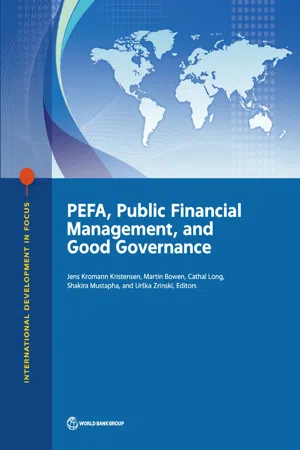
PEFA, Public Financial Management, and Good Governance
- English
- PDF
- Available on iOS & Android
PEFA, Public Financial Management, and Good Governance
About This Book
This project, based on the Public Expenditure and Financial Accountability (PEFA) data set, researched how PEFA can be used to shape policy development in public financial management (PFM) and other major relevant policy areas such as anticorruption, revenue mobilization, political economy analysis, and fragile states. The report explores what shapes the PFM system in low- and middle-income countries by examining the relationship between political institutions and the quality of the PFM system. Although the report finds some evidence that multiple political parties in control of the legislature is associated with better PFM performance, the report finds the need to further refine and test the theories on the relationship between political institutions and PFM. The report addresses the question of the outcomes of PFM systems, distinguishing between fragile and nonfragile states. It finds that better PFM performance is associated with more reliable budgets in terms of expenditure composition in fragile states, but not aggregate budget credibility. Moreover, in contrast to existing studies, it finds no evidence that PFM quality matters for deficit and debt ratios, irrespective of whether a country is fragile or not. The report also explores the relationship between perceptions of corruption and PFM performance. It finds strong evidence of a relationship between better PFM performance and improvements in perceptions of corruption. It also finds that PFM reforms associated with better controls have a stronger relationship with improvements in perceptions of corruption compared to PFM reforms associated with more transparency. The last chapter looks at the relationship between PEFA indicators for revenue administration and domestic resource mobilization. It focuses on the credible use of penalties for noncompliance as a proxy for the type of political commitment required to improve tax performance. The analysis shows that countries that credibly enforce penalties for noncompliance collect more taxes on average.
Frequently asked questions
Information
Table of contents
- Front Cover
- Contents
- Preface
- Acknowledgments
- About PEFA
- About the Authors and Editors
- Summary
- Abbreviations
- 1 Introduction: What Is PFM and Why Is It Important?
- 2 Measuring PFM Performance through PEFA: Approach and Methodology
- 3 Political Institutions and PFM Performance
- 4 Budget Credibility, Fiscal Outcomes, and PFM Performance in Fragile and Nonfragile Countries
- 5 PFM and Perceptions of Corruption Cathal Long
- 6 Revenue Administration Performance and Domestic Resource Mobilization
- Box
- Figures
- Tables